IGTP professionals participate in the Plan for Prevention and Control of Hepatitis C in Catalonia

This July the Government of Catalonia officially approved the Plan for Prevention and Control of Hepatitis in Catalonia, which aims to facilitate the adoption and implementation of measures to reduce the number of cases and the morbidity and mortality associated with this infection. This is in line with the goal of the WHO, which aims to eliminate hepatitis C by 2030. The plan is the result of healthcare and public health professionals, experts, representatives of scientific societies and organizations and patients and families associations all working together.
Of the 24 members of the commission responsible for elaborating the plan, 6 of them are professionals connected with the IGTP on the Can Ruti Campus. Four are researchers from the CEEISCAT, including its director, Dr Jordi Casabona, Dr Juliana Reyes, Dr Cinta Folch and Dr Nuria Vives together with Dr Elisa Martró, Leader of the Clinical Virology and New Diagnostic Approaches Research Group of the IGTP and Dr Veronica Saludes, a researcher in the same group. These last two scientists have participated in the commission that wrote the document, in its revision and in the working group "challenges and proposals to improve prevention and early detection of the infection."
A key factor in tackling hepatitis C is focussing attention on the most vulnerable populations, increasing the rate of diagnosis and making treatment available in order to identify and treat new cases as quickly as possible. Dr Martro's research group at the IGTP works within the Microbiology Service (Clinical Laboratory North Metropolitan Area of Barcelona) at the Germans Trias University Hospital, they have brought their expertise in diagnostic approaches for infections by the hepatitis C virus in these sectors of the population. This includes detection from dried blood spot samples, developed through various different research projects carried out in conjunction with the CEEISCAT and Catalan Agency for Public Health (ASPCAT)
The plan was published in 2017 and been being rolled out for two years. It was officially approved by the Government of Catalonia on 3 July 2019.

